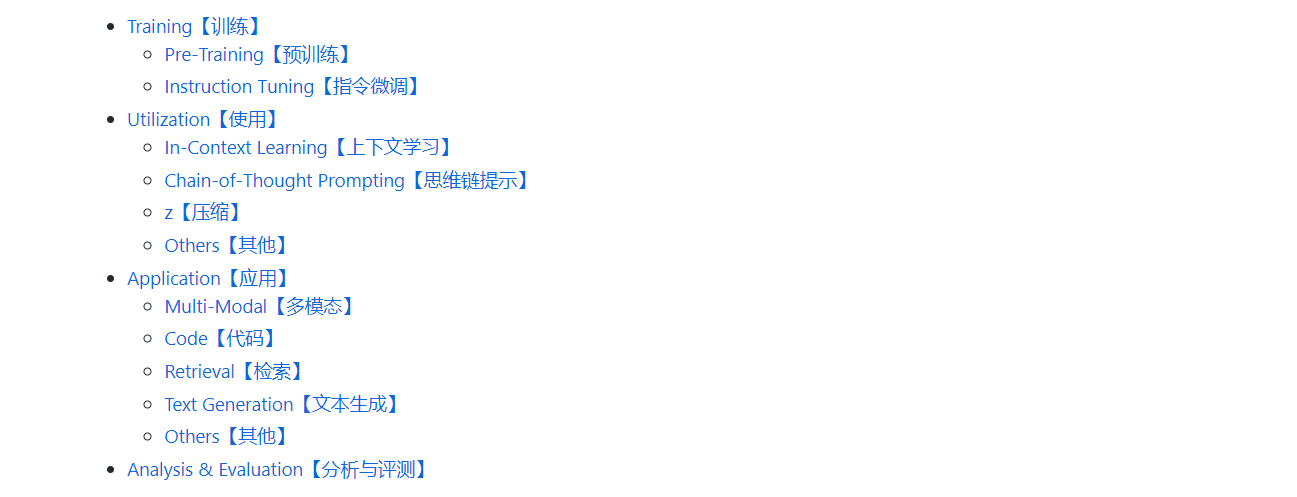© 作者|王晓磊 机构|中国人民大学
研究方向 | 对话式信息获取 ****
****本文整理了2022年以来发表在顶级会议上的大语言模型相关论文。
导读
去年底,OpenAI 推出的 ChatGPT 在短短数月内已经风靡全球。这个基于 GPT-3.5 的大型语言模型,具备惊人的自然语言生成和理解能力,可以像人类一样进行对话、翻译、摘要等任务。由于其优秀的表现,ChatGPT 及其背后的大型语言模型迅速成为人工智能领域的热门话题,吸引了广大科研人员和开发者的关注和参与。 本文整理了 2022 年在各大顶会(ACL、EMNLP、ICLR、ICML、NeurIPS等)发表的和大型语言模型相关的论文,共计 100 篇。论文列表已经同步更新到 Github仓库(https://github.com/RUCAIBox/Top-conference-paper-list),欢迎大家关注和 Star。
Catalog(目录)
-
Training【训练】
-
Pre-Training【预训练】
-
Instruction Tuning【指令微调】
-
Utilization【使用】
-
In-Context Learning【上下文学习】
-
Chain-of-Thought Prompting【思维链提示】
-
Compression【压缩】
-
Others【其他】
-
Application【应用】
-
Multi-Modal【多模态】
-
Code【代码】
-
Retrieval【检索】
-
Text Generation【文本生成】
-
Others【其他】
-
Analysis & Evaluation【分析与评测】
Training【训练】
Pre-Training【预训练】
- UL2: Unifying Language Learning Paradigms
- Learning to Grow Pretrained Models for Efficient Transformer Training
- Efficient Large Scale Language Modeling with Mixtures of Experts
- Knowledge-in-Context: Towards Knowledgeable Semi-Parametric Language Models
- CodeGen: An Open Large Language Model for Code with Multi-Turn Program Synthesis
- InCoder: A Generative Model for Code Infilling and Synthesis
- CodeBPE: Investigating Subtokenization Options for Large Language Model Pretraining on Source Code
- CodeRetriever: A Large Scale Contrastive Pre-Training Method for Code Search
- UniMax: Fairer and More Effective Language Sampling for Large-Scale Multilingual Pretraining
- GLM-130B: An Open Bilingual Pre-trained Model
- When FLUE Meets FLANG: Benchmarks and Large Pretrained Language Model for Financial Domain
Instruction Tuning【指令微调】
- What Makes Instruction Learning Hard? An Investigation and a New Challenge in a Synthetic Environment
- InstructDial: Improving Zero and Few-shot Generalization in Dialogue through Instruction Tuning
- Learning Instructions with Unlabeled Data for Zero-Shot Cross-Task Generalization
- Super-NaturalInstructions: Generalization via Declarative Instructions on 1600+ NLP Tasks
- Boosting Natural Language Generation from Instructions with Meta-Learning
- Help me write a Poem - Instruction Tuning as a Vehicle for Collaborative Poetry Writing
- Multitask Instruction-based Prompting for Fallacy Recognition
- Not All Tasks Are Born Equal: Understanding Zero-Shot Generalization
- HypeR: Multitask Hyper-Prompted Training Enables Large-Scale Retrieval Generalization
Utilization【使用】
In-Context Learning【上下文学习】
- What learning algorithm is in-context learning? Investigations with linear models
- Ask Me Anything: A simple strategy for prompting language models
- Large Language Models are Human-Level Prompt Engineers
- Using Both Demonstrations and Language Instructions to Efficiently Learn Robotic Tasks
- kNN Prompting: Beyond-Context Learning with Calibration-Free Nearest Neighbor Inference
- Guess the Instruction! Flipped Learning Makes Language Models Stronger Zero-Shot Learners
- Selective Annotation Makes Language Models Better Few-Shot Learners
- Active Example Selection for In-Context Learning
- Rethinking the Role of Demonstrations: What Makes In-Context Learning Work?
- In-Context Learning for Few-Shot Dialogue State Tracking
- Few-Shot Anaphora Resolution in Scientific Protocols via Mixtures of In-Context Experts
- ProGen: Progressive Zero-shot Dataset Generation via In-context Feedback
- Controllable Dialogue Simulation with In-context Learning
- Thinking about GPT-3 In-Context Learning for Biomedical IE? Think Again
- XRICL: Cross-lingual Retrieval-Augmented In-Context Learning for Cross-lingual Text-to-SQL Semantic Parsing
- On the Compositional Generalization Gap of In-Context Learning
- Towards In-Context Non-Expert Evaluation of Reflection Generation for Counselling Conversations
- Towards Few-Shot Identification of Morality Frames using In-Context Learning
Chain-of-Thought Prompting【思维链提示】
- ReAct: Synergizing Reasoning and Acting in Language Models
- Selection-Inference: Exploiting Large Language Models for Interpretable Logical Reasoning
- Neuro-Symbolic Procedural Planning with Commonsense Prompting
- Language Models Are Greedy Reasoners: A Systematic Formal Analysis of Chain-of-Thought
- PINTO: Faithful Language Reasoning Using Prompt-Generated Rationales
- Decomposed Prompting: A Modular Approach for Solving Complex Tasks
- Complexity-Based Prompting for Multi-step Reasoning
- Automatic Chain of Thought Prompting in Large Language Models
- Compositional Semantic Parsing with Large Language Models
- Self-Consistency Improves Chain of Thought Reasoning in Language Models
- Least-to-Most Prompting Enables Complex Reasoning in Large Language Models
- Entailer: Answering Questions with Faithful and Truthful Chains of Reasoning
- Iteratively Prompt Pre-trained Language Models for Chain of Thought
- ConvFinQA: Exploring the Chain of Numerical Reasoning in Conversational Finance Question Answering
- Induced Natural Language Rationales and Interleaved Markup Tokens Enable Extrapolation in Large Language Models
Compression【压缩】
- Understanding and Improving Knowledge Distillation for Quantization Aware Training of Large Transformer Encoders
- The Optimal BERT Surgeon: Scalable and Accurate Second-Order Pruning for Large Language Models
- AlphaTuning: Quantization-Aware Parameter-Efficient Adaptation of Large-Scale Pre-Trained Language Models
Others【其他】
- BBTv2: Towards a Gradient-Free Future with Large Language Models
- Compositional Task Representations for Large Language Models
- Just Fine-tune Twice: Selective Differential Privacy for Large Language Models
Application【应用】
Multi-Modal【多模态】
- Visual Classification via Description from Large Language Models
- Socratic Models: Composing Zero-Shot Multimodal Reasoning with Language
- Plug-and-Play VQA: Zero-shot VQA by Conjoining Large Pretrained Models with Zero Training
Code【代码】
- DocPrompting: Generating Code by Retrieving the Docs
- Planning with Large Language Models for Code Generation
- CodeT: Code Generation with Generated Tests
- Language Models Can Teach Themselves to Program Better
Retrieval【检索】
- Promptagator: Few-shot Dense Retrieval From 8 Examples
- Recitation-Augmented Language Models
- Generate rather than Retrieve: Large Language Models are Strong Context Generators
- QUILL: Query Intent with Large Language Models using Retrieval Augmentation and Multi-stage Distillation
Text Generation【文本生成】
- Generating Sequences by Learning to Self-Correct
- RankGen: Improving Text Generation with Large Ranking Models
- Eliciting Knowledge from Large Pre-Trained Models for Unsupervised Knowledge-Grounded Conversation
Others【其他】
- Systematic Rectification of Language Models via Dead-end Analysis
- Reward Design with Language Models
- Bidirectional Language Models Are Also Few-shot Learners
- Composing Ensembles of Pre-trained Models via Iterative Consensus
- Binding Language Models in Symbolic Languages
- Mind's Eye: Grounded Language Model Reasoning through Simulation
Analysis & Evaluation【分析与评测】
- WikiWhy: Answering and Explaining Cause-and-Effect Questions
- ROSCOE: A Suite of Metrics for Scoring Step-by-Step Reasoning
- Quantifying Memorization Across Neural Language Models
- Mass-Editing Memory in a Transformer
- Multi-lingual Evaluation of Code Generation Models
- STREET: A MULTI-TASK STRUCTURED REASONING AND EXPLANATION BENCHMARK
- Leveraging Large Language Models for Multiple Choice Question Answering
- Broken Neural Scaling Laws
- Language models are multilingual chain-of-thought reasoners
- Language Models are Realistic Tabular Data Generators
- Task Ambiguity in Humans and Language Models
- Discovering Latent Knowledge in Language Models Without Supervision
- Prompting GPT-3 To Be Reliable
- Large language models are few-shot clinical information extractors
- How Large Language Models are Transforming Machine-Paraphrase Plagiarism
- Neural Theory-of-Mind? On the Limits of Social Intelligence in Large LMs
- SLING: Sino Linguistic Evaluation of Large Language Models
- A Systematic Investigation of Commonsense Knowledge in Large Language Models
- Lexical Generalization Improves with Larger Models and Longer Training
- What do Large Language Models Learn beyond Language?
- Probing for Understanding of English Verb Classes and Alternations in Large Pre-trained Language Models
成为VIP会员查看完整内容
相关内容
Arxiv
0+阅读 · 2023年5月19日
Arxiv
0+阅读 · 2023年5月19日
Arxiv
0+阅读 · 2023年5月18日
Arxiv
33+阅读 · 2023年2月18日
Arxiv
11+阅读 · 2019年11月4日


